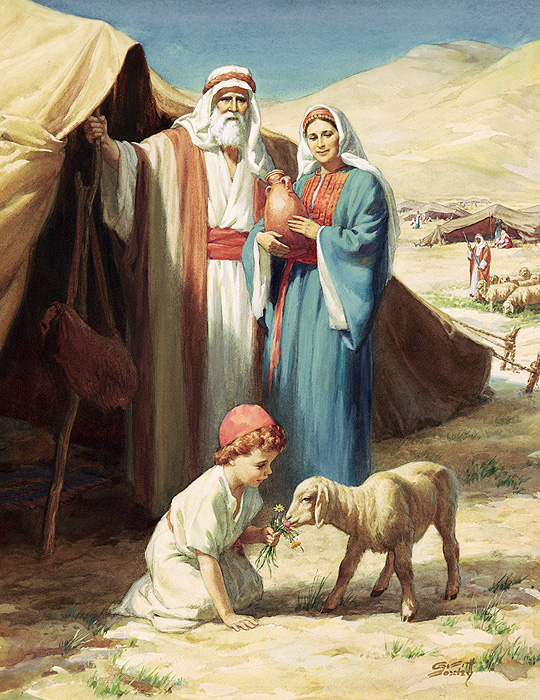YAHWEH OUR GOD 1
In a baby dedication ceremony, the pastor’s giving the meaning of the child’s name is impressive. Many parents choose names because they are family names or because they are familiar and pleasant sounding. Some names reflect the parent’s desire that their children will develop exemplary character. Most parents want their children’s names to be more than identifying labels.
They want the names to reflect the children’s uniqueness or their individuality. They recognize that names are important.
The Scriptures contain many names for God. These multiple names suggest that God cannot be pressed into the perimeters of human language. He is much more than any name or number of names can express. Yet the name by which He makes Himself known- Yahweh- is foundational in our admittedly limited understanding of Him. It identifies Him as the personal God who stands alone, who has always existed, and who does not change. Our culture has the false notion that many gods exist or many expressions of God exist. Of course this is diametrically opposed to what
The Bible teaches about the one true God’s character and nature. It’s important for us to discover the significance of God’s name – doing so can help us trust Him and live confidently in a religiously diverse culture.
Read Exodus 6:2-8 Yahweh Promises
There are more than 100 different names and titles for God and Jesus in the Bible. What is your favorite name or names for God and why? (I guess mine is “Lord”.) God declared, “I am Yahweh”. KJV version is “I am the Lord”. In Hebrew language, the letters YHWH (based on the verb “to be”) occurred with no vowels. Suggested translations include “I am what I am”, “I will be what I will be”, “I will be (or continue to be) who I always have been”, and “I am He who is”. This leads to common suggestion for the meaning of Yahweh –“I am what I will reveal to you who I am”. God was reaffirming His historical relation to the patriarchs but here there is a difference in the revelation. Verse 3 tells us that God said He appeared to Abraham, Isaac, and Jacob as “God Almighty” (El Shaddai in Hebrew). This indicates a difference in the way they had known Him and the way He was going to be known in the Exodus from Egypt. The earlier emphasis had been upon the power of God. The new emphasis was to be on His presence, His existence. There are several instances prior to Moses’ time where the name of Yahweh is used in the Old Testament (Gen 15:2, 8; 16:2; 24:31; 38:13). However, it is clear that the real understanding of the nature of God took a major step forward in the Exodus experience. God gave Moses the reason Moses could trust Him to deliver the Israelites from Pharaoh’s clutches.
Small problems need only small answers. But when we face great problems, God has an opportunity to exercise His great power. As the Hebrews troubles grew steadily worse God planned to intervene with His mighty power and perform great miracles to deliver them. Big problems put you in a perfect position to watch God give big answers. God’s promises in these verses were fulfilled to the letter when the Hebrews left Egypt. He freed them from slavery, became their God and accepted them as people. Then He led them to the land He had promised. When God redeems us from sin, He delivers us, accepts us, and becomes our God. Then He leads us to new life as we follow Him. God would make the Hebrews His covenant people. God wants a personal, covenant relationship, which involves mutual responsibilities, with all people. He wants to be involved in our lives.
Read Exodus 15:1-3 Yahweh Keeps His promise
Music played an important part in Israel’s worship and celebration. Singing was an expression of love and thanks, and it was a creative way to pass down oral traditions. The song of Moses was likely the oldest recorded song in the world. It was a festive epic poem celebrating God’s victory, lifting the hearts and voices of the people outward and upward. After being delivered from great danger, they sang with joy! Psalms and hymns can be great ways to express relief, praise and thanks when we have been through trouble. God kept His promise and the people felt led to sing about it. What memories do you have of your parents or even grandparents singing? (Mother would sometimes sing a lullaby. She seldom sang. I was the one always singing.) If you were to write a song about God victoriously keeping His promises or providing help in your life, what events would you include in that song? (Always present, I could always talk with HIM, helping in going to Air Force, helping in getting a college degree, and praising Him for sending Barbara my way.) Music has always been a big part in my life. Barbara sang in two Big Bands, Shelly has done solo work since she was fourteen, Ric is currently in the music business in Nashville, and I have been in a church choir since I was 18. I remember the choir Barbara and I joined in Biloxi while in the Air Force tech school. The church director looked and talked like Yul Brynner, but had a marvelous voice.
Read Exodus 15:11-13 Yahweh Stands Alone
In verses 4-10, in picturesque, poetic language, the joyful song of praise to Yahweh chronicled the destruction of Pharaoh’s Army in the Red Sea. Throughout Moses hymn, the focus is on Yahweh and His redemptive action. Verse 11 contains two rhetorical questions (Lord, who is like you among the gods? and Who is like you…?) whose expected answers are “NO ONE”. No one among the gods was like Yahweh. He was in class by Himself, with no peers. The Israelites did not acknowledge other gods’ existence; other nations’ so-called gods were fictional. They certainly knew that the Egyptians had their idols and “gods”; but they were saying that Yahweh alone is the true, LIVING GOD; all others were false.
In a similar song, Hannah proclaims the complementary answers to the questions of verse 11- “There is none holy like the Lord; there is none besides you; there is no rock like our God” (1 Sam. 2:2). The following verses, beginning with verse 13, like the song as a whole (v.9), describe Israel’s journey out of Egypt and into the land of Canaan. They anticipate the fear that will befall the surrounding peoples, the Philistines, the Edomites, and the Moabites, as well as the Canaanites. They were growing in their faith and confidence in Yahweh. The term “redeemed” in verse 13, refers to God’s dealings for the sake of His people, rescuing them from danger and fostering the conditions in which their faithfulness may flourish (EX. 6:6; Ps. 74:2; 77:15; 106:10; Isa. 52:9; 62:12; 41:14).
Yahweh stretched out His right hand and exerted His might. The singers used human terms to describe God’s redeeming act for them. The phrase “right hand” signified strength and victory. God exercised His great power to free His people. The Israelites expressed their confidence that Yahweh would continue to “lead” them with His “faithful love”. The reference to His “holy dwelling” may also have referred to the future Jerusalem sanctuary, but they more likely were still focused on the promise land of Canaan. The Bible makes it clear that God is God alone- the Only One we should worship. Other religion’s claims need not intimidate us. The Christian faith’s exclusivity means we do not accept the idea of other gods, but we respect others’ right to hold differing views. We should, however, always explain the one true God and the one true way to Heaven- in love!
A BOOK ON RETIREMENT WITH FOCUS ON SALVATION Copy and Paste:
http://fe3cec4ym5wnbt6b65qsvz4w0r.hop.clickbank.net/?tid=RETIREONSALVATION
http://f5548i1vh9vr8v1hw1rseuap3f.hop.clickbank.net/?tid=TEACHTHEBIBLE







